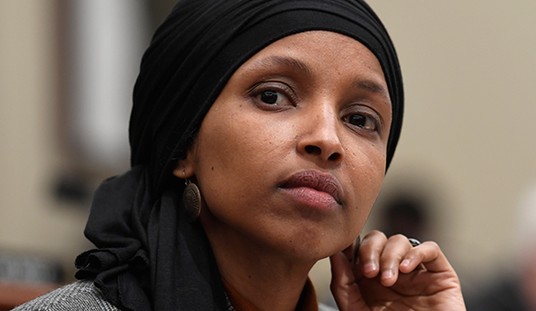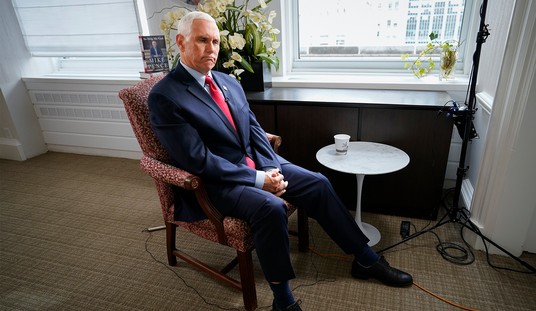
A man carries two children after panic broke out among mourners who payed their respect at the attack sites at restaurant Le Petit Cambodge (Little Cambodia) and the Carillon Hotel in Paris, Sunday, Nov. 15, 2015. Thousands of French troops deployed around Paris on Sunday and tourist sites stood shuttered in one of the most visited cities on Earth while investigators questioned the relatives of a suspected suicide bomber involved in the country’s deadliest violence since World War II. (AP Photo/Peter Dejong)
When we rang in the 21st century, it seemed safe then to predict it would be a century about nothing — an Age of Seinfeld, at least to those not paying much attention. America’s political battles during the ’90s and through 2000 were loud and fierce, belying the tiny stakes. We fought valiantly for or against school uniforms, tax credits for this or for that, V-chips, internet porn. Europe had settled into a stupor, dull but safe. Nations of the former Warsaw Pact were scurrying to join NATO. Russia, formerly the all-mighty Soviet Union, had been stripped of half its population and was led as it were by a ludicrous drunk. China had given up the dictatorship of the proletariat for getting rich quick.
The big question of the 20th century had been settled, and soundly. That question had been if the the West could co-exist with Europe’s mutant-twin totalitarian ideologies, national socialism and international communism. National socialism was answered with a bottle full of cyanide capsules in Hitler’s bunker under Berlin, and in the mushroom clouds over Hiroshima and Nagasaki. Communism’s answer came with somewhat less drama, as communist states withered away so that people could enjoy a little capitalism.
If history wasn’t exactly at an end, then at least on the surface it seemed to have taken a breather. We did indeed party like it was 1999.
And that breather was nice — if all-too-brief.
History came roaring back in the form of hijacked airliners and crashing skyscrapers on a sunny September morning in 2001. Since then we’ve up-ended terror-sponsoring governments, killed untold thousands of jihadis, and waged war against radical Islam for nearly 5,200 consecutive days.
And yet on Friday, Paris endured its second terrorist attack in under a year, this one even more terrible than the first.
If the 21st century has a big question, it was asked on September 11, 2001. That question is: Can the West coexist with radical Islam, or in the worst case even with Islam at all?
Unlike a global hot or cold war, jihad can be done on the cheap. A few well-trained bombmakers can keep an entire generation of half-educated suicide bombers primed for mass murder. A few “migrants” with rifles and smartphones can hold hostage a great city, a City of Light, killing or wounding hundreds.
The jihadis are smart and they are adaptable. They take inspiration from the atheist Mao Zedong (“The guerrilla must move amongst the people as a fish swims in the sea”) or from Hollywood filmmakers as much as they do from the Koran.
The West’s response has so far been an impossible combination of recklessness, fecklessness, and denial. We went into Iraq in 2003 with enough force to destroy the Iraqi Army, but without enough boots to enforce the peace. We continue to squander blood and treasure in Afghanistan, 13 years after that war’s main aim — really, its only achievable aim — had been won. We turned our backs on the only government in Egypt willing to take on the Muslim Brotherhood, just as we turned our backs on Iraq for ignoble reasons of domestic politics. An imprudent air war ruined Libya and created a safe haven for ISIS, and added precipitously to the flow of migrants to Europe — jihadis swimming among them in a furtive invasion. Then there is Syria, a cauldron of misery, the birthplace of the Islamic State, a training ground for jihadis, and a proving ground for Vladimir Putin’s newest weapons and for his renewed imperial vision.
And of course Iran, tantalizingly close to becoming the first nuclear-armed terrorist state. Western governments seem inexplicably and obliviously happy to pony up $150 billion for the pleasure of listening to chants of “Death to America” while Iran’s most advanced centrifuges spin and spin and spin.
Europe eliminated its internal borders to improve trade, but also effectively removed its external borders — swelling the Continent with refugees and making Paris an all-too-inviting target. The backlash in “dull but safe” Europe promises to be as ugly as it has been delayed — the former being the inevitable consequence of the latter.
And yet in Europe’s capitals there is still no consensus on an obvious matter like staunching the flow of Muslim invaders. While ISIS threatens to do to us what they’ve now done twice to France, our president assures us the real threat comes from climate change. In Syria, Obama promises only to double down on his failed strategy.
Recklessness, fecklessness, and denial, indeed.
We fight like it’s 1999, like it’s a war about nothing.
The jihadis fight as though they mean to conquer the world, although their reach exceeds their grasp.
We fight as though there’s no point or even any need to win, although we could. In our War About Nothing, we cripple our own intelligence, open our borders, and comfort ourselves with false hopes about the efficacy of a phony air war against a canny enemy.
We may lack the will, but we do not lack the means. God help us if we ever allow the situation to deteriorate to the point where our choices are either suicide of genocide.
We have not yet reached that dark place, but the undoing of the Iran sanctions regime in exchange for little more than a handful of magic beans does not lend hope that we aren’t headed there. And have little doubt that if jihadis obtain the means to destroy an American or European city or three, that they will use them.
The time to formulate a real and coherent strategy against radical Islam was on September 12, 2001. I wrote almost exactly one year ago today that we’re losing because ISIS has the “audacity and ruthlessness to win a war, and we do not.”
After Friday’s attacks in Paris, the only two qualities we should look for in our next president are audacity and ruthlessness. All the rest is fluff and must be cast aside before our Age of Seinfeld becomes our children’s Age of Slaughter.










Join the conversation as a VIP Member